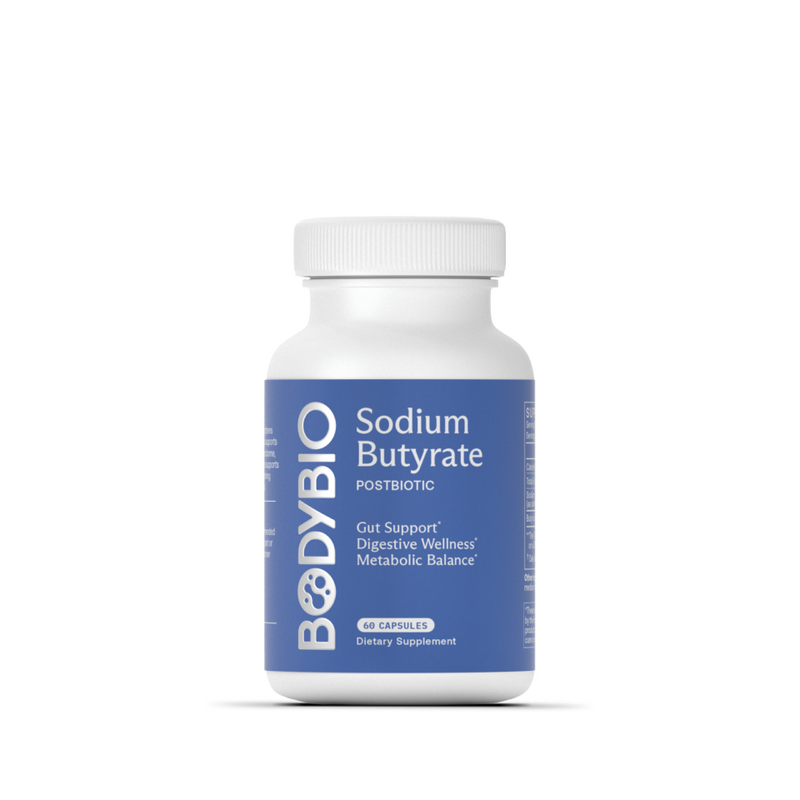Introducing Postbiotics — The Newest Biotic for Total Microbiome Support
At this point, probiotics and even prebiotics are somewhat ubiquitous in the integrative and alternative health space. And for good reason––both have shown support for microbiome and gut health, brain health and hormone regulation, cardiovascular function, immune regulation, and more [1, 2, 3].*
Postbiotics, on the other hand, are still the new kid on the block in the “biotic” family. But they may prove to be just as or even more effective than their precursors.
In this article, we’ll investigate what postbiotics are, how they relate to pre- and probiotics, the benefits of postbiotics, and how to increase your postbiotic intake.
What Are Postbiotics?
Postbiotics are the newest “biotic,” a sister compound to pre- and probiotics. Prebiotics refer to whole foods and different types of fiber that fuel probiotic bacteria. Postbiotics refer to the end products created by probiotics in our large intestine, where most of our probiotic bacteria live in what’s known as the microbiome.
Of the three “biotic” categories, postbiotics may just become the most revolutionary, as we learn more about their effects on total body health and wellbeing.
There are several different types of postbiotics, including [4]:
- Aromatic amino acids
- Organic acids
- Exopolysaccharides (EPS)
- Enzymes
- Short-chain fatty acids (SCFAs)
- Vitamins.
Short-Chain Fatty Acids (SCFAs)
There is still a lot of research to be done on the wide variety of postbiotics and their effects on human biology. For now, the most promising postbiotics are the short-chain fatty acids, or SCFAs. There are just three types that make up most of the SCFAs produced by the microbiome: acetate, propionate, and butyrate.
SCFAs are really good news for your health; they have a wide range of benefits, including supporting cellular function and supporting the immune system.* Research has also shown that they have antimicrobial effects, and they support a healthy inflammation response.* They can help support a healthy appetite and healthy blood sugar levels [4].*
Butyrate, one of the three main SCFAs, shows special promise for a range of health issues and conditions, especially related to the gut. Butyrate [5, 6]:
- Maintains the delicate gut lining, which is only a single-cell thick
- Provides 90% of the energy required by colonic cells
- Supports the gut mucosa*
- Promotes cell differentiation*
- Supports a healthy inflammation response in the colon*
- Promotes brain health, including mental acuity and cognition*
- Supports healthy cholesterol metabolism*
- Increases mineral absorption.*
The Relationship Between Prebiotics, Probiotics, and Postbiotics
Let’s do a quick review of the prebiotic to probiotic to postbiotic process. Here’s how we end up with postbiotics in our gut.
- We consume prebiotic fiber. Prebiotic foods include vegetables like onions, garlic, leafy greens, root vegetables; fruits like bananas, apples and oranges; starches like potatoes; and grains like rice and quinoa. These foods are ideal for beneficial bacteria to initiate the fermentation process.
- These prebiotic foods provide fuel for our probiotic bacteria in the gut. Probiotics ferment prebiotic foods to make various metabolites, depending on the type of bacteria. For example, certain probiotic strains make butyrate, which we naturally call butyrate-producing bacteria.
- Probiotics produce postbiotics, such as SCFAs. The end result of bacterial fermentation is a postbiotic. In the case of SCFAs, they may have several potential health benefits, including maintaining and strengthening the gut wall itself.* This leads to a virtuous cycle where postbiotics maintain homeostasis in the gut, so probiotics can continue making more postbiotics, and so on.
You can read more about the connection between prebiotics, probiotics, and postbiotics here.
Do you have enough postbiotics in your gut?
Millions of Americans deal with gut issues like IBS, small intestinal bacterial overgrowth (SIBO), inflammatory bowel disease (IBD), acid reflux, and more. If you are experiencing one of these conditions, chances are high that there is some kind of imbalance in your gut bacteria, and therefore you may not be producing the postbiotics needed to stabilize the gut environment.
Obstacles and conditions that may lower postbiotic production include:
- Irritable bowel syndrome (IBS)
- Inflammatory bowel disease (IBD)
- Celiac disease/gluten intolerance
- SIBO
- Leaky gut
- Infections, such as candida overgrowth, Lyme disease, parasites, or H. Pylori
- Isolated gut symptoms such as diarrhea, constipation, and bloating
- Malabsorption of nutrients.
Fortunately, it’s possible to increase the postbiotics in your gut. Let’s take a closer look at some of the key benefits of postbiotics and how you can increase your postbiotic intake.
Benefits of Postbiotics
Postbiotics have a wide range of therapeutic benefits both locally in the gut and systemically throughout the body.
Fuel the Gut Lining
Butyrate, our friendly postbiotic SCFA, serves as the main energy source for the colonic epithelial cells that line the gut wall.* Without enough butyrate, these cells can become “leaky,” leaving large gaps between them where bacteria, toxins, and other cellular byproducts end up in systemic circulation.
But when these cells are appropriately nourished, they can do their job of maintaining the intestinal permeability that allows nutrients into our bloodstream, and keep waste and any microorganisms within the colon [7].
Balance the Microbiome
Postbiotics can have positive regulatory effects on the gut microbiota, from directly feeding probiotic bacteria to preventing the growth and spread of pathogenic organisms.* This speaks to the benefits of having a diverse array of probiotic bacteria in the gut; multiple strains of bacteria produce multiple types of postbiotics, some of which feed back into probiotic function [8].
Enhance Immunity
Postbiotics can support the immune system by influencing the microbiome and supporting gut health. Postbiotics have proven useful in supporting gut health for those who struggle with GI issues* [9, 10, 11].
Support Cognitive Health
Postbiotics like butyrate may also support cognitive function.* Butyrate increases a compound called brain-derived neurotrophic factor, which supports our ability to learn and retain information [12]. It also helps us to develop and change neurological pathways, known as neuroplasticity. This is our ability to unlearn and rewire everything from habitual behaviors to learning new languages* [13].
Butyrate can also help promote healthy cognition by binding and sequestering ammonia, a toxic byproduct of normal cellular functions [14].*
Further Reading: 10 Benefits of Butyrate for Total Body Health
How To Increase Your Postbiotic Intake
You can directly influence your postbiotic levels through consuming different foods and beverages, but to see substantial changes you may need to supplement postbiotics such as butyrate. Let’s take a closer look at two methods for increasing your postbiotic intake.
Postbiotic Food Sources
We can get postbiotics from some foods, including:
- Butter (contains butyrate)
- Dairy products, such as yogurt and cheese
- Other fermented foods such as kimchi, sauerkraut, kombucha, etc.
As you’ve probably realized, these foods are also abundant in probiotics, which make our postbiotics. It only makes sense that you’d find postbiotics along with your probiotic strains.
However, you can also support postbiotic production in your gut by consuming certain foods, like:
- Cooled rice, potatoes, oats, and legumes: When cooked and cooled, these foods become resistant starches, which specifically feed butyrate-producing bacteria [13].
- Whole grains
- Asparagus
- Apples
- Bananas/plantains.
Fibrous foods are the key to providing fuel for the microbiome to make postbiotics. The above list represents just a few examples of many foods that can support your gut bacteria and help you produce more postbiotics like butyrate. But like anything, too much fiber too quickly can be a bad thing. Slowly increase your intake of fibrous foods, and experiment with what foods taste good to you and make you feel good at the same time.
Postbiotic Supplements
Postbiotic supplements are still a relatively new category in the health and wellness industry. There are many companies out there that promote a beneficial “postbiotic” product that is either low-quality to begin with or diluted with fillers and additives.
BodyBio has been making high-quality BodyBio Butyrate for over a decade, backed by thousands of happy customers and integrative health practitioners alike. Supplementing butyrate may benefit you if:
- You experience digestive issues such as diarrhea, constipation, gas, bloating, etc.
- You struggle with mental fatigue and brain fog
- You want to support and regulate your immune system
- You already take probiotics and want to increase their activity and benefits to your microbiome.
These are all great reasons to give supplemental butyrate a try. When you choose BodyBio Butyrate over another postbiotic supplement, you can rest assured that you’re getting a high-quality product that has been lab-tested and is free from unnecessary additives and common allergens.
Heal and Fortify Your Microbiome with Postbiotics
We’ve only just begun to learn about the implications of postbiotics, but it’s already clear that they have real, positive implications for human health and wellbeing. When we support the microbiome and the gut environment, we support the immune system, mood and brain health, the nervous system, and the daily functions of our bodies on a cellular level.
If you’re intrigued by the possible benefits of postbiotic therapy, butyrate is a great place to start.

